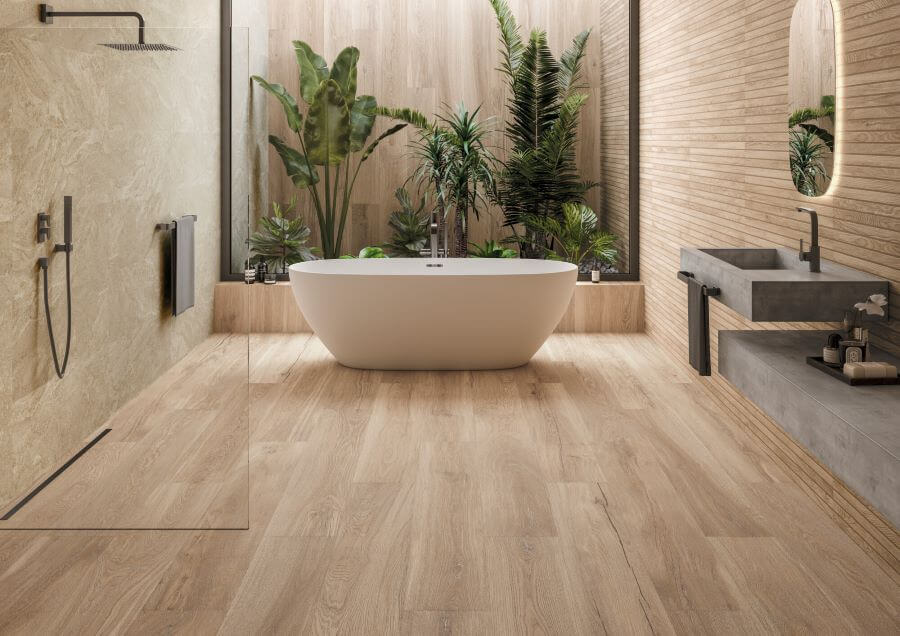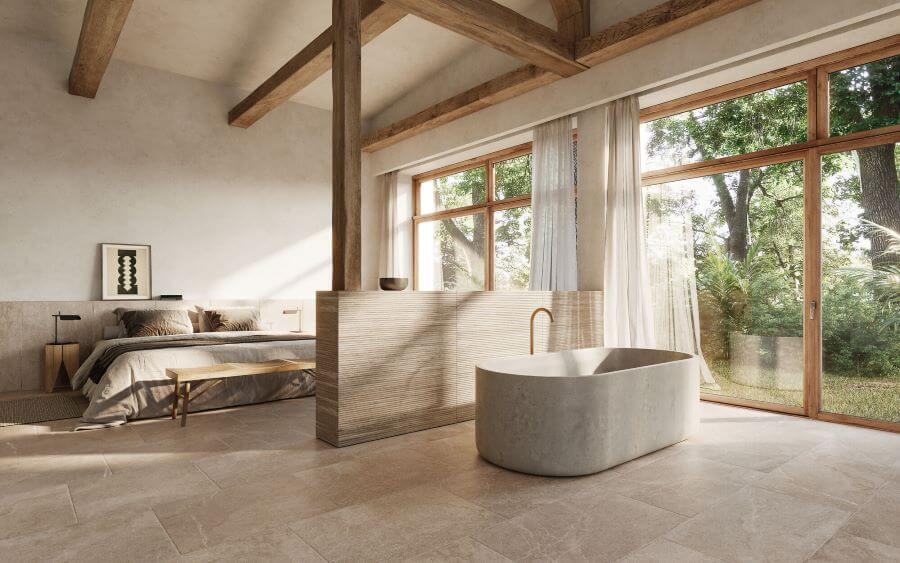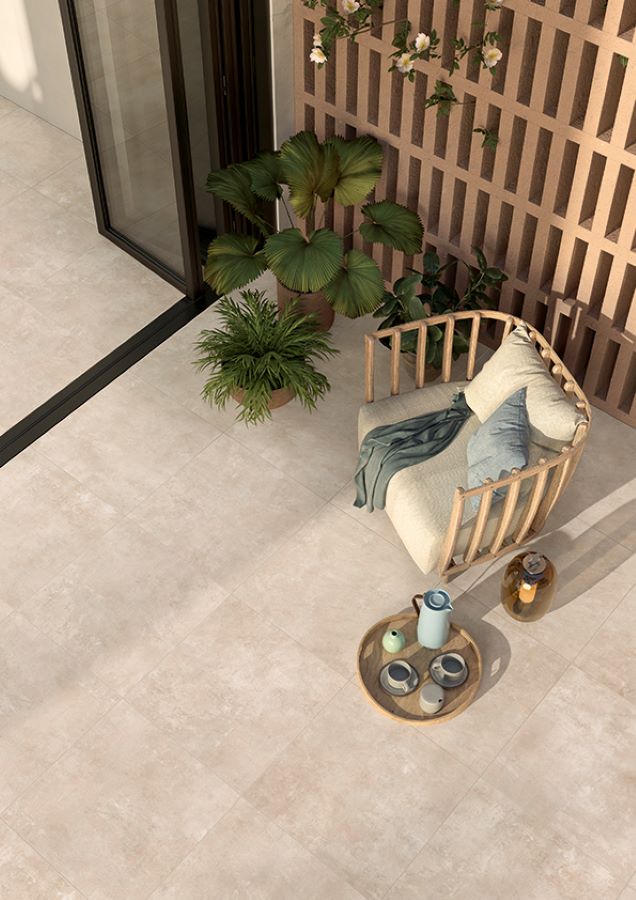

Do I need to seal porcelain floor tiles? It’s one of the questions we are asked the most and there is plenty of information and advice out there. But it can all be a bit confusing so we’ve put this blog together to help. So read on and find out more.
Porcelain is a brilliant material, it is a mix of mineral and clays fired at high temperatures and it is this that gives porcelain it’s superior performance. Porcelain is exceptionally hardwearing and highly resistant to staining and scratching and once it’s installed requires minimal ongoing maintenance. That makes it absolutely perfect for busy kitchens, dining areas, hallways, lounges, offices, boot rooms and more! In fact the whole home. From a cleaning perspective, a quick mop with water will generally do the trick and every few weeks you can use a mild detergent specially formulated for porcelain tiles.
So, do I need to seal porcelain floor tiles? To be called porcelain, a tile has typically less than 0.5% porosity. This is one of the reasons porcelain can be used in the shower or outside for example. Our porcelain tiles do not need sealing at all. For us, it’s one of the key benefits of porcelain, that there is no ongoing, regular maintenance required. In addition, it makes the installation process quicker too as there isn’t a further sealing process that needs to take place.
It is worth pointing out however, that not all tiles are waterproof, some are porous. This is because they have microscopic holes on the surface so if left untreated, they are more likely to potentially stain or mark. In this case, it is important that these tiles are sealed with a good quality sealant that forms a protective layer over the tile surface. This prevents dirt penetrating the surface. Over time these sealants may need to be reapplied as part of an ongoing maintenance programme so it is important to understand how to care for your tiles in the future too. It may be a key consideration as these processes can take time.
The best way to find out if your tiles need to be sealed is to check with your supplier regards your chosen tiles. Tiles that are porous on the surface need to be sealed and that is usually tiles such as natural stone, marble etc so it is always worth a check. Or you can do a test on a small patch of your tiles, if you leave a damp cloth on the surface and it leaves a mark, then chances are the tiles need to be sealed.
As well as great durability, porcelain has a wealth of benefits over other materials and of course, it works brilliantly with underfloor heating, acting a bit like a thermal brick.
Porcelain tiles have developed over the years to mimic other materials – think marble, wood, metal, stone, quartz, slate and more. Leading manufacturers are echoing these materials with incredible realism thanks to ground-breaking tile technology so wood collections might now house 30 or 40 different patterns and the pattern and texture cleverly align so the tiles not only look like wood but actually feel like real wood.
The same can be said of marble and stone, again, number of patterns of faces brings incredible realism to tiles and another brilliant advantage of good quality porcelain tiles is the fact you know what you are getting. Even though colour can vary slightly batch to batch, the variances should be minimal unlike some natural stones which can vary immensely making it tricker to design colours schemes around flooring.
Of course, the real beauty here is that with porcelain you have all the beauty of the real material eg wood, with none of the associated ongoing maintenance. So unlike natural stone or real marble which are not only expensive, but are also prone to wear, scratching and staining, your porcelain tiles are highly scratch resistant, wear resistant, stain resistant and typically more cost effective.
The other great advantage of porcelain tiles is they can also be used outside because they are fade and frost resistant too. In addition, porcelain naturally inhibits the growth of mould and moss on the tile surface so with the exception of a very dark, dank corner that doesn’t see daylight, your tiles are pretty easy to maintain. Also, with advances in tile technology, tiles are now available that co-ordinate for inside and outside so you can run the same look of tile from lounge to lawn.
As we have already discovered, porcelain tiles can also be used outside. External porcelains are usually 20mm in thickness and come with an anti-slip surface texture. Our 20mm patio pavers do not need sealing, however again, do check with your supplier regards your specific tiles to be sure whether the tiles you are purchasing need sealing.
It’s a good idea to use a grout protector spray to seal grout. Grout is porous and can more easily absorb liquids or dirt. With rectified porcelain tiles grout lines for floors are as thin as 3mm so are at an absolute minimum.
Most grouts are cementitious grouts ie made from cement which is porous and can mark over time – particularly lighter colour grouts, so using a good grout protector spray will keep your floors looking beautiful for longer. It’s a pretty easy process so just follow the instructions on the product!
Amongst other good quality suppliers, Fila Solutions and Lithofin both offer grout sealant products. For more information get in touch with us.
Epoxy grouts are more durable and don’t need to be sealed, so if you are concerned about grout you could opt for Epoxy however, check with your tiler before choosing as these grouts are trickier to work with and aren’t ideal for some tile surfaces that are more textured as they can tricker to clean off after the initial application.
It’s really important that a final clean is carried out by the installer once your porcelain tiles are fitted. This ensures all the organic dirt and excess grout that has built up over the installation period on the tile surface is cleaned away and makes the job of keeping your tiles looking beautiful is easier. If this isn’t done properly it can feel as though dirt is just being pushed around on the tile surface rather being cleaned off the tile surface.
Once this final and easy step is completed, every day cleaning to remove general dirt is pretty straightforward all round. A sweep to remove loose debris with a broom followed by a mop and warm water will usually do the trick day to day. Periodically give your tiles a deeper clean with a specialist detergent – one that does not leave a wax or film membrane on the tile surface as some off-the-shelf cleaners can do, again follow the instructions.
We hope we have answered your query, do I need to seal porcelain floor tiles. In conclusion, our porcelain floor tiles do not require sealing, but always check with your supplier to be sure before committing to a tile. If you would like know more about our porcelain tiles then simply complete the form below or click on any of the links in this blog to take you to our website!
All our porcelain tiles are high quality tiles from Italy and Spain and we’ve hand-picked collections to work across the home!
.
If you would like to know more, please get in touch...
The TilePortfolio specialise in Italian and Spanish Porcelain and Ceramic tiles, in particular large format Porcelains and Porcelain tiles for inside and outside. Our carefully curated, stunning tile portfolios are beautifully presented online and supported by our fuss-free ‘go-the-extra-tile’ service. In addition, you can view our entire tile collection at our Northamptonshire Showroom. Visit our website for unmissable interiors inspiration. The TilePortfolio team are always available to chat, we’d be delighted to help with your project so please do get in touch.
Please note: We strongly recommend using a professional tiler for your project. Installation requirements may vary depending on the tiles you choose, the fixing products used and the specific conditions. Always check with your tiler regards the suitability of the tiles. Please get in touch with us if you have any questions.
GET IN TOUCH
Call, Text, WhatsApp: 07395 011861
Landline: 01536 856 108
Email: hello@thetileportfolio.co.uk
Visit Us: The TilePortfolio Showroom, Glebe Farm,
A14, Junction 7, Kettering, NN16 8XF
Company No. 13033923
VAT No. 376573947
Reg. Office: Headlands House 1 Kings Court
Kettering, Northants, NN15 6WJ
2024 © Copyright The TilePortfolio Limited
